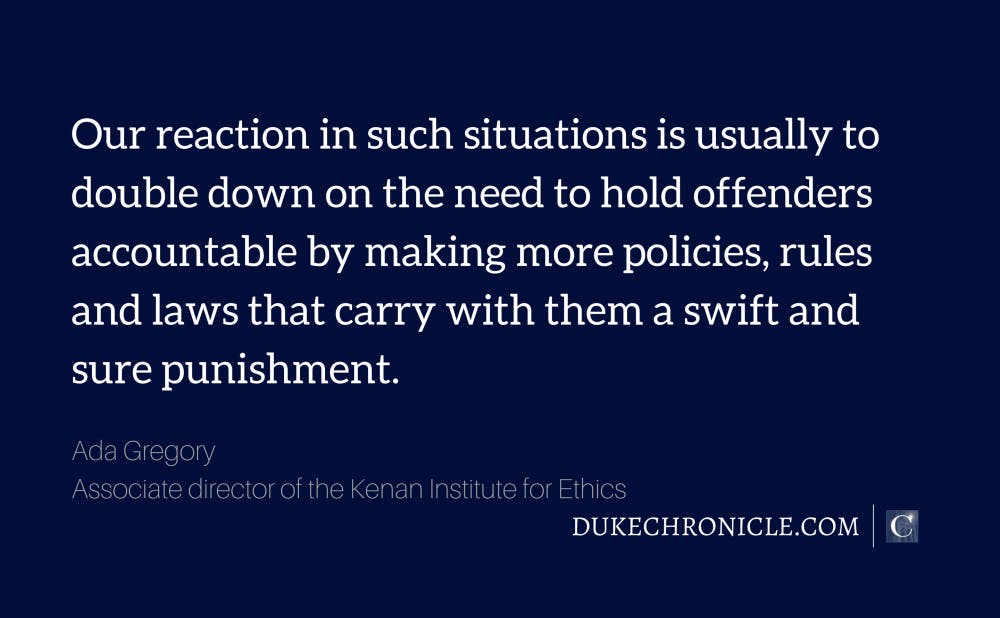With the semester only days underway, we’ve already seen some of the worst of our nature in and around our campus—racial epithets, skirmishes around Silent Sam and likely dozens of other incidents that never rose to the attention of public scrutiny—often without any clear offender to blame. Our reaction in such situations is usually to double down on the need to hold offenders accountable by making more policies, rules and laws that carry with them a swift and sure punishment. But such crime-and-punishment approaches often do little to prevent reoccurrences or repair the pain and harm left in the wake of the offender’s actions—the harm that festers and compromises what should be a supportive learning environment for everyone. And when no offender can be pinpointed, we too easily shrug off the obligation to answer hard questions, as if there is nothing we can do beyond denouncements that provide no path to change.
Perhaps a new way forward can be found in the very old tradition of restorative justice: focusing on the needs of those harmed while acknowledging that we are all better than the worst thing we’ve done. Restorative justice looks at offenses not as isolated incidents, but consequences of deeper systemic issues that must be confronted to repair the collective harm to the community and to decrease the likelihood of recurrence. In restorative justice, victims, communities and wrongdoers together discuss the harms created by an offense and what should be done to make amends—a process does not preclude formal sanctions through typical retributive justice mechanisms. Restorative justice is far from perfect. It may be just as time-consuming as our current approach with the added complexity that it depends on offenders owning their wrongdoing and victims willing to speak to their offenders. And therefore, it is simply not appropriate in every instance. However, the emphasis on repairing and preventing harms, rather than blame and punishment, seems to offer a chance for something better, particularly when those affected don’t trust the institutional systems meant to address them.
An expansive notion of restorative justice practices is emerging that fosters restorative community by proactively developing positive relationships, creating shared values, and managing conflict through social discipline that restores relationships by acknowledging and repairing harms—even when they may not reach the threshold of a clear law or policy violation or when the wrongdoer is unknown. These practices include restorative inquiry, circle processes, informal conferencing and affective expression/questions to give individuals a space to express feelings, ideas and experiences and reflect on how their behavior affects others by emphasizing listening, trust-building and the collaborative identification of solutions to complex problems as a part of everyday life as well as in response to emerging crises on campus, in the community or in the world.
We need to make Duke that kind of restorative community and integrate these kinds of practices into the Duke experience. This summer a group of faculty, staff and students came together through the Building Restorative Community (BRC) initiative at the Kenan Institute for Ethics to introduce these concepts in summer workshops, Resident Advisor training, FAC Board activities and soon in Greek life programs. But so much more work remains and we need your help.
To be sure, some may say that building restorative community to combat hate speech, sexual harassment, racial incidents or any number of harms on campus sounds like magical thinking, but it appears to be magical thinking with promising results in K-12 schools, universities and communities around the world who have tried it. Is that really any more fanciful than pretending that conventional punitive responses meet victim and community needs and reduce the recurrence of problems in the future? Perhaps we have enough hope left to transform how we approach each other and prevent more of these incidents from happening in the first place. If we want true and lasting change, we need to talk together about what we do when bad things happen.
Ada Gregory is the associate director of the Kenan Institute for Ethics. If you are interested in getting involved in the BRC initiative, email ada.gregory@duke.edu.
Get The Chronicle straight to your inbox
Signup for our weekly newsletter. Cancel at any time.

